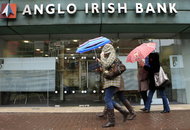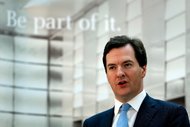 Peter Muhly/Agence France-Presse — Getty ImagesAn Anglo Irish Bank branch in Belfast, Northern Ireland.
Peter Muhly/Agence France-Presse — Getty ImagesAn Anglo Irish Bank branch in Belfast, Northern Ireland.
LONDON – The Irish government passed emergency legislation on Thursday to liquidate Anglo Irish Bank, one of the country’s largest financial institutions.
The legislation, which was signed into law after an all-night parliamentary session, came after negotiations with the European Central Bank over swapping so-called promissory notes, which were used to bail out the Irish lender in 2009, for long-term government bonds.
The move is an effort to reduce Ireland’s debt repayments at a time when the country is still struggling under a cloud of austerity measures and meager economic growth.
The Irish Parliament rushed through the legislation to liquidate Anglo Irish, which was renamed Irish Bank Resolution Corporation after its failure and bailout, because details of the debt-restructuring plan leaked on Wednesday. Politicians had hoped to announce the deal after agreeing on new terms with the European Central Bank.
“I would have preferred to be introducing this bill in tandem with a finalized agreement with the European Central Bank,” the Irish finance minister, Michael Noonan, said in a statement.
The European Central Bank is considering the country’s latest proposals on Thursday, though European policy makers are concerned that a deal with Ireland could set a precedent for other indebted countries, like Spain, whose local banks also are facing mountains of debt.
As part of the deal to save Anglo Irish, Dublin injected more than 30 billion euros ($41 billion) into the local lender, of which around 28 billion euros is still outstanding.
The bailout has saddled the government with 3.1 billion euros in annual interest payments, or roughly the same amount Irish politicians have said they would cut in yearly government spending to reduce the country’s debt levels. The local government has been eager to reduce that multibillion-euro figure by swapping the high-interest debt into long-term government bonds that can be repaid over a longer period.
Ireland racked up huge debts in bailing out Anglo Irish and the rest of the country’s financial industry, eventually requiring a rescue package of 67.5 billion euros from the European Union and the International Monetary Fund in 2010. The authorities have demanded that Irish politicians slash government spending to reduce the country’s debt burden.
Confusion reigned on Thursday at Anglo Irish’s headquarters in Dublin, a day after employees were sent home early in preparation for the government-mandated liquidation.
Some staff members had returned to work, but the atmosphere remained tense, according to a person with direct knowledge of the matter, who spoke on condition of anonymity because he was not authorized to speak publicly.
“People have been told it’s business as usual, but it’s anything but that,” the person said.
The accounting firm KPMG has been appointed to oversee the liquidation.
Under the terms of the liquidation, Anglo Irish’s assets will be transferred to the National Asset Management Agency, the so-called bad bank set up by the government, or sold to outside investors.
Anglo Irish has been at the center of controversy since the beginning of the financial crisis. Three of its former executives, including its former chief executive, Sean FitzPatrick, are facing fraud charges in connection with loans that were improperly administered.
Article source: http://dealbook.nytimes.com/2013/02/07/ireland-to-liquidate-anglo-irish-bank/?partner=rss&emc=rss
